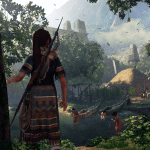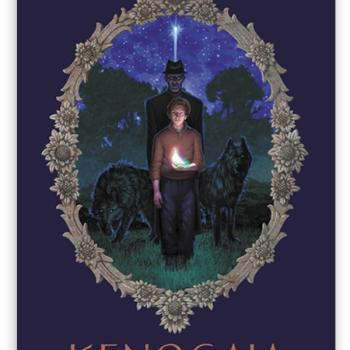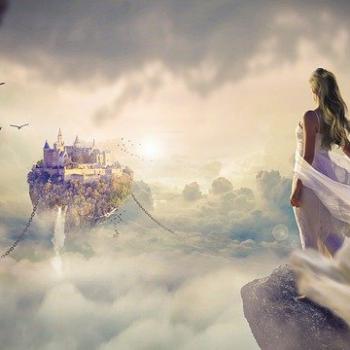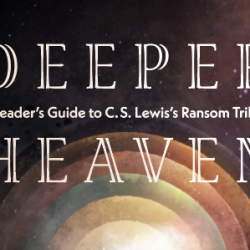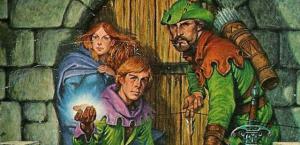
I have been consistently reading Terry Brooks’s Shannara Chronicles for the last eighteen years of my life—longer than any other fantasy epic I’ve ever followed. (The chronologically first book in the series, First King of Shannara, was the very first “grown-up” fantasy novel I ever read.) This year, that series draws to a close with the publication of The Last Druid, the chronologically final entry in this sprawling saga. And I’d be lying if I didn’t admit these books have a special place in my little nerd heart, even if they haven’t really been at their very best for the last decade.
There are dozens of books in this series, but newcomers are most likely to pick up 1977’s The Sword of Shannara—which is a shame, because it’s (by far) the worst in the series and (let’s be honest) an enormous ripoff of The Lord of the Rings. We have a magical setting (the Four Lands), a dark supervillain (the Warlock Lord), a caste of sagacious magic wielders (Druids), a MacGuffin (the eponymous Sword, which has the power to disclose the essential truth about those who wield it), and an assortment of Elves, Gnomes, Trolls, Men, and Dwarves. If you started and stopped with Sword, you’d be left pretty cold.
Fortunately, Brooks’s books didn’t continue rehashing Tolkien’s. The next few volumes—The Elfstones of Shannara, The Wishsong of Shannara, and the four-book Heritage of Shannara series—knocked things out of the park, with memorable and innovative plotting, great characters, and brilliant set pieces. (Elfstones even ended up as a short-lived MTV adaptation.) Of course some of the plot elements were derivative, but that was the fun of it: the books worked because they remixed familiar ideas into something delightfully pulpy.
As time went on, the philosophical complexity of the saga deepened. The metaphysical foundation of the series, at bottom, is a quasi-Manichaean spiritual conflict between the powers of the Word (order/light/God) and the Void (darkness/chaos). Benign magical entities, like the Elves, derive from the creative power of the Word, while savage demons proceed from the Void. All of this took shape in a trio of urban fantasy thrillers centered on magic wielders known as “Knights of the Word” battling demons in modern-day America. And sometime around 2006 or 2007, it became clear that the high fantasy of the core Shannara novels was actually postapocalyptic fantasy: following a nuclear cataclysm circa A.D. 2100, “Trolls” and “Dwarves,” among others, appeared as human beings transformed by thousands of years of environmental stresses, and “Druids” were spiritual descendants of the Knights of the Word.
All of this is the stuff of grand, old-fashioned, swashbuckling adventure—and when Brooks is good, he’s really good (the Voyage of the Jerle Shannara trilogy and the Genesis of Shannara trilogy, for the most part, fire on all cylinders). But that said, the last dozen or so primary novels—the High Druid of Shannara trilogy, the Dark Legacy of Shannara trilogy, the Defenders of Shannara trilogy, and the recent Fall of Shannara tetralogy—have been stuck in a bit of a holding pattern, posing the same few questions over and over again. Will the Druids continue to involve themselves in the affairs of the Four Lands, or will they cede ground to the advancements of human science? Will the demon armies of the Void, trapped in the prison known as the “Forbidding,” successfully cross over into the mortal world? Will our heroes be able to master the magic they were born with? Any genuinely final resolution of these questions is perpetually deferred—and alas, The Last Druid proves no better at answering them than any of its predecessors.
But that’s not to say the new book has nothing compelling on its mind. In fact, the central question of the future of the Druids is one of the clearest-eyed fictional interrogations of secularization that I can recall encountering.
If the underlying clash between the principles of Word and Void is fundamentally theological (and it is), the magic wielded by their followers is, in some sense, a kind of “religious” practice. And throughout the series, the parallels between Brooks’s “magic” and religious faith as such are pervasive. Magic, like belief, is commonly passed on through family ties. Magic, like religious conviction, is very difficult to control, and organizations formed for the control and propagation of magic (various iterations of the Druid Order) frequently splinter into schismatic factions. There is a modern political community that distinguishes itself from other surrounding societies by its commitment to a magical identity and heritage (the Elven nation, which, in terms of its role within the story, bears more than a passing resemblance to the State of Israel). Magic, like religious conviction, has a tendency to pop up in areas of the world where it has been believed extinct. Most obviously, in Angel Fire East the magic of the Word leads to the virginal conception of the individual who saves a remnant of humanity from nuclear devastation.
The Druids, almost alone among their analogues in other fantasy novels of the same stripe, are profoundly conflicted over the role of magic in the world, and willing to consider the possibility that an organized Druid Order should fade away. (One thinks of Dietrich Bonhoeffer’s Prison Letters, posing the possibility of a “religionless Christianity” emerging in response to secularizing forces.) The Last Druid is not exactly sanguine about that possibility—after all, it was human science that led to the nuclear war that kicked off the saga—but the book nevertheless pushes the question one step beyond where it currently is being posed in the actual world. If, as many people have theorized, the modern world falls away and old forms of believing and belonging reassert themselves, history will not end. The clock will continue to run. So what, then, might a post-postliberal world look like?
The premise driving Brooks’s meta-tale is that magic (faith) and science (reason) are essentially doomed to be at each other’s throats until the end of time—that, in the end, only one can enjoy pride of place in the societal order. And yet it is abundantly clear that both magic and science are real and efficacious, that both sets of practices tap into true features of the cosmic order. So why can the Shannara saga never really envision a moment when Druids and scientists might build universities together, working side-by-side in a shared quest for truth?
The fatal weakness of the Druid Order, it has always seemed to me, is its essentially defensive—or, better, detached—posture toward the surrounding world. Time and again, the Order is shown to fail when it simply attempts to raise up practitioners who sequester themselves in their keep while the world turns on; at least three times in the course of the saga, the Druid Order crumbles from within, cannibalizing itself rather than looking beyond its narrow confines. Never is there any serious or sustained attempt to share Druid knowledge with the world at large.
This is not a notion Brooks develops at length—indeed, I’m inclined to treat his repeated revisitation of this motif as a case of narrative path-dependence rather than conscious thematic repetition—but it is a persistent undercurrent throughout the whole series. And I’d say it is a particularly sobering point to ponder for anyone who, like me, is largely happy to sit in his little air-conditioned library, leafing through obscure texts and churning out pages of esoteric metaphysical reflections. The contrary lesson of the Shannara books—in admittedly somewhat impressionistic strokes—is that if theology cannot be made relevant to the world in which one lives, one ought not be surprised when the world wonders why it needs theology at all.
The actual world, of course, is not likely to follow the path sketched out for it by Brooks. Secularization is out; “strange rites” are in. It seems far likelier that we will see ever-greater balkanization, along religious and cultural lines, than that a unified, technologically progressive society will advance to the point of spontaneous implosion. But it still seems to me that the long thematic arc of Brooks’s storied saga—laden as it is with serious theological-philosophical substance—is worth contemplating nevertheless…even if The Last Druid isn’t quite the blockbuster finale that longtime fans deserve.
(I received an advance reader copy of The Last Druid from NetGalley. I was not required to write a positive review.)


